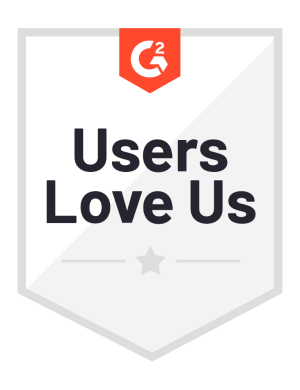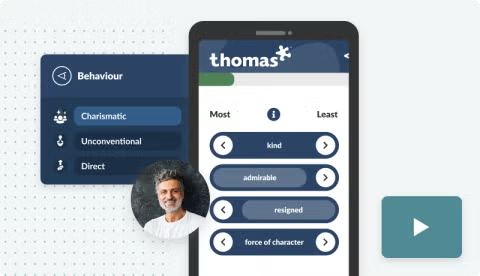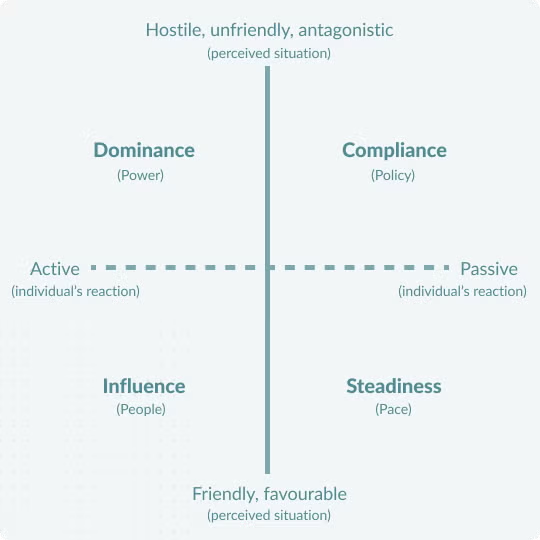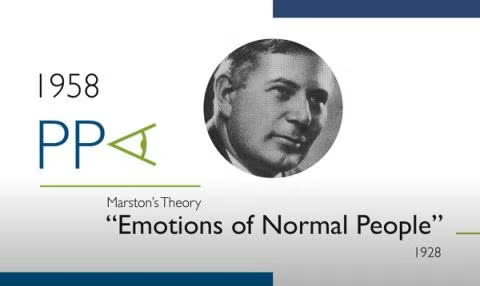DISC Assessment
Get insights into behavior at work
- Recruit the right person
- Manage performance
- Improve communication
- Motivate and engage staff
- Identify areas for development
- Enhance team effectiveness


What our happy customers say
How the Thomas DISC test works
The DISC profile test provides an accurate insight into how people behave at work. Use it when recruiting, identify where to allocate your learning and development resources, and understand where you need to adjust your approach to avoid staff turnover and getting the best out of people through better management.


What is DISC theory?
The DISC model is an accurate theory used to understand human behaviors. It provides an increased level of self-awareness and awareness of others through a common language and framework of understanding and is split into four behavioral types:
- D - Dominance (with description)
- I - Influence/Inducement
- S - Steadiness/Submission
- C - Compliance
Most people show all four of these behavior patterns, but in a work setting you'll display one or more of them consistently. This is because you develop a behavioral style which places particular emphasis on certain behaviors and less emphasis on others.

Our team sat the DISC assessment, and we all found the results to be very accurate considering how few questions it asked. Using it to gain greater understanding and insight into candidates is invaluable when recruiting, and I can see it being an essential tool for managing a team as well.
How can the Thomas DISC test be used?

Our assessments use the DISC theory to show you:
- How someone is motivated
- How they like to communicate
- What their strengths and limitations are
- How they interact with others
- How they behave under pressure
The assessments will help you make better hiring decisions, improve employee wellbeing and increase retention. People feel happier when you understand them, start with Thomas.
Have more questions?
What is a DISC behavioural assessment?
DISC stands for Dominance, Influence, Steadiness and Compliance (sometimes referred to as Conscientiousness) and is a behavioral assessment which understands behaviors and priorities by gauging responses to various routine questions. The test-takers answers are charted on a graph which breaks down these four behaviors.
DISC theory was invented in 1928 by William Moulton Marston in his book ‘Emotions of Normal People’. He explained that people show their emotions and responses using four behavioral types - Dominance, Inducement (Influence), Submission (Steadiness), and Compliance. Doctor Thomas Hendrickson evolved the theory and developed PPA (Personal Profile Analysis) for the workplace in the late 1950s and early 1960s.
Although the acronym ‘DISC’ has only been used since the mid-twentieth century, the tenets of this four-style behavior model have actually been around for millennia. In fact, it’s believed that Hippocrates began to describe this concept around 400 BC as part of the ancient theory of the Four Temperaments of Humorism.
How do DISC assessments work?
DISC is a non-judgmental tool which employers use to understand employees’ workplace strengths and weaknesses by delving into their behavioral differences.
When completing a DISC profile assessment, candidates answer a short series of questions honestly, which will then produce a detailed report about their personality and behavior. It’s a valuable tool for assessing a candidate's strengths and weaknesses, and there is no such thing as a good or bad profile. Asking your employees to complete a DISC profile may also serve as a benchmark for future employees, help them grow and understand how they might interact with other personality types within their team.
A DISC profile provides a common language upon which employees can build and sustain relationships. It can help test-takers understand themselves, how they respond to specific situations, and how that might affect their dealings with clients and team members.
What are the advantages to staff and recruitment of an online DISC assessment?
Psychometric assessment generally, including the PPA, are highly predictive of work outcomes. Large-scale academic meta-analyses show psychometrics to be amongst the most predictive recruitment methods for future job and training performance.
The Thomas DISC assessment has been independently audited by the British Psychological Society and accredited based on its validity, reliability and fairness.
Having candidates complete a DISC assessment gives access to behavioral insights which aren’t accessible via typical recruitment methods such as structured interviews and assessment centers. In psychology terms, we call this incremental validity - using interviews and the PPA leads to a significantly better prediction of future performance.
It is a quick and cost-effective recruitment method to save your Hiring Team time and ensure that you’re hiring the person who really is the best fit for the role.
What does a DISC assessment measure?
DISC – in relation to its use in the workplace - is an assessment of your behavior, not your personality. But what’s the difference between personality and behavior? Personality refers to a person’s traits and characteristics in general. Whereas behavior refers to the way a person acts or reacts depending upon the situation. Personality is what we are, whereas behavior is what we do.



